Abstract
Prostaglandin (PG) E2 is a potent hyperthermic agent and has been assigned an intermediary function in the response of thermoregulatory neurons to pyrogens. Though attractive, this idea has been challenged on several grounds. The present study confirms that brain PGE2 synthesis increases during fever, the time course of the elevation according with a causative role of the compound. Our experimental data also argue against the involvement of a second cyclooxygenase product, specifically thromboxane (TX) A2, in the action of pyrogens. The sequence of events leading to PGE2 production and fever differs depending on the pyrogen, bacterial vs. leucocytic, and its route of administration. Blood-borne interleukin-1 (IL-1) acts on a discrete site in the central nervous system (CNS) which is tentatively identified with the organum vasculosum laminae terminalis (OVLT). The same site may also be the target for blood-borne endotoxin. In addition, endotoxin may promote PGE2 synthesis in the cerebral microvasculature. Both pyrogens, on the other hand, act diffusely throughout the CNS when given intrathecally. We conclude that PGE2 is well suited for an intermediary role in the genesis of fever and ascribe the reported inconsistencies to methodological factors.
Full text
PDF
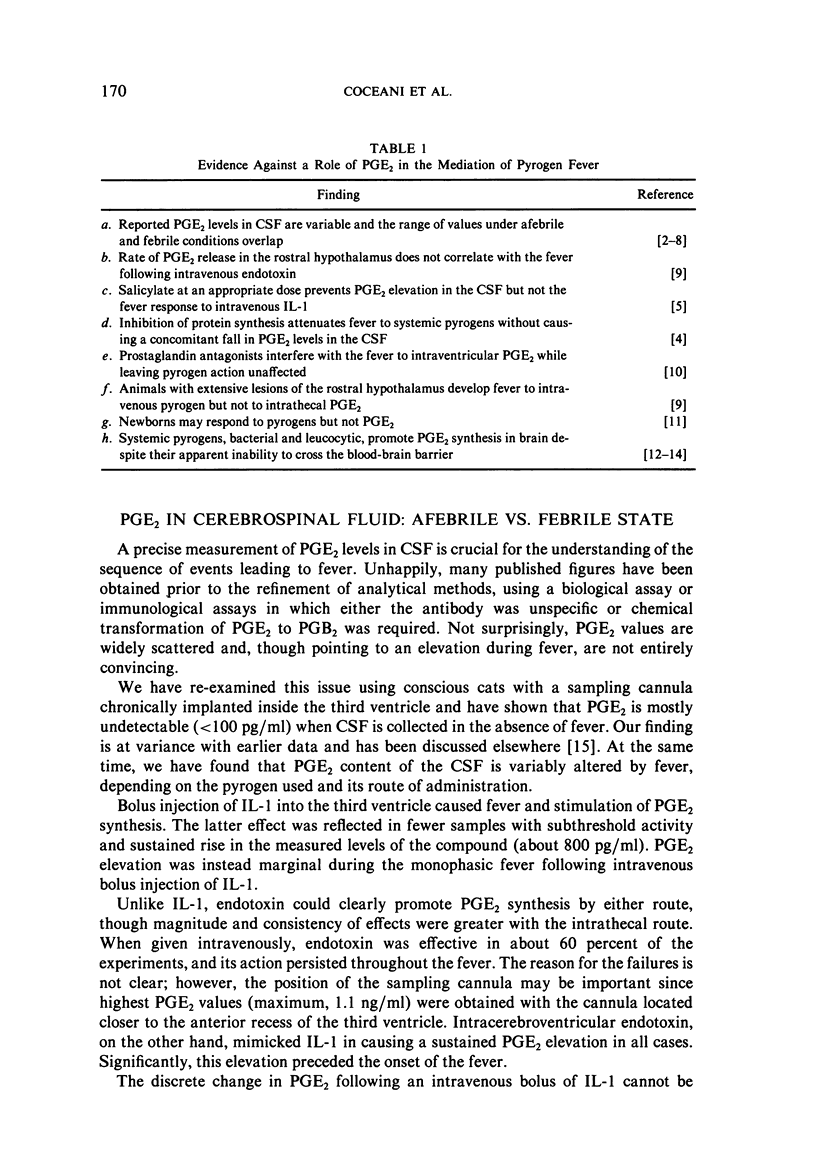
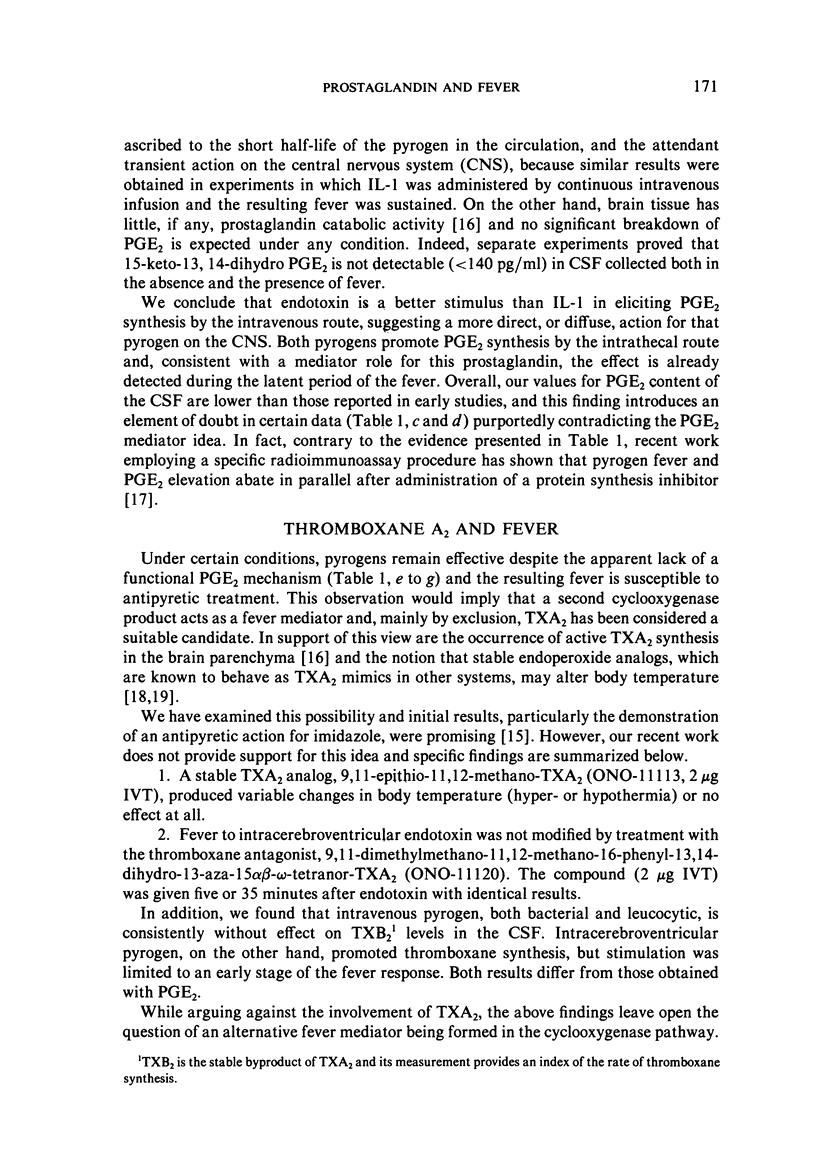
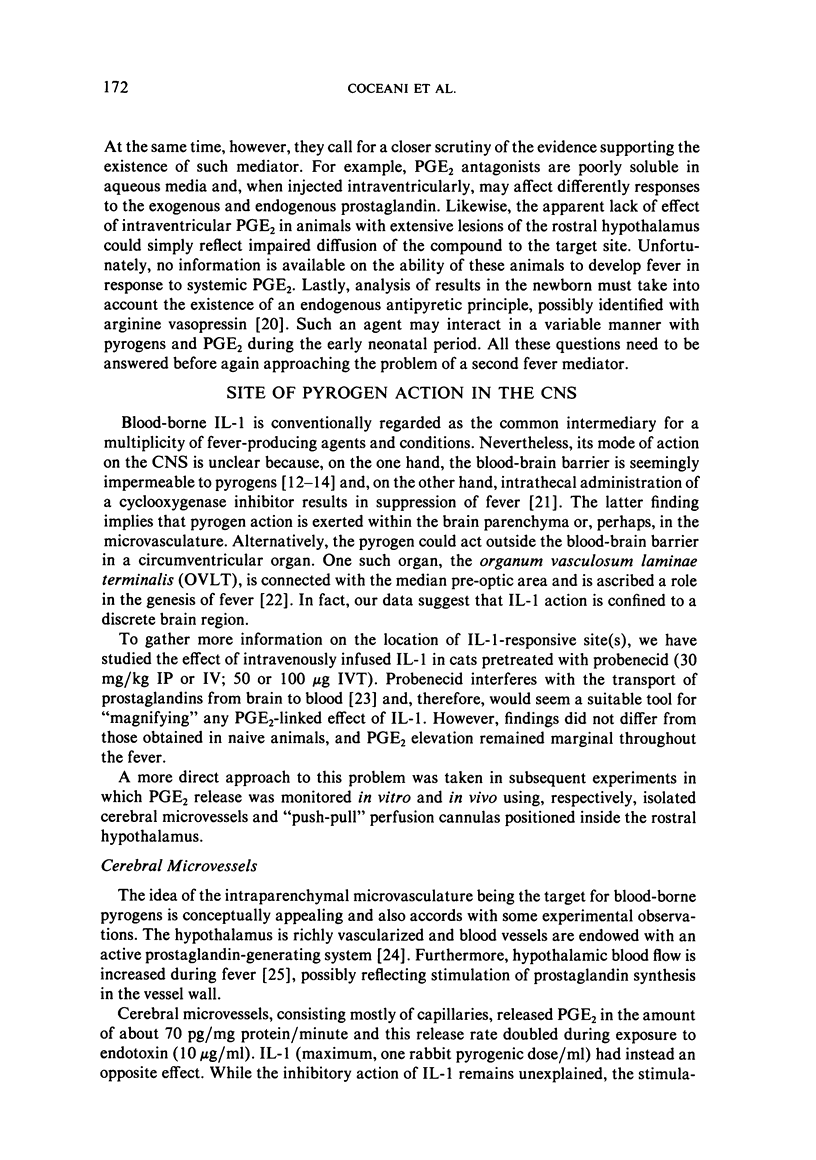
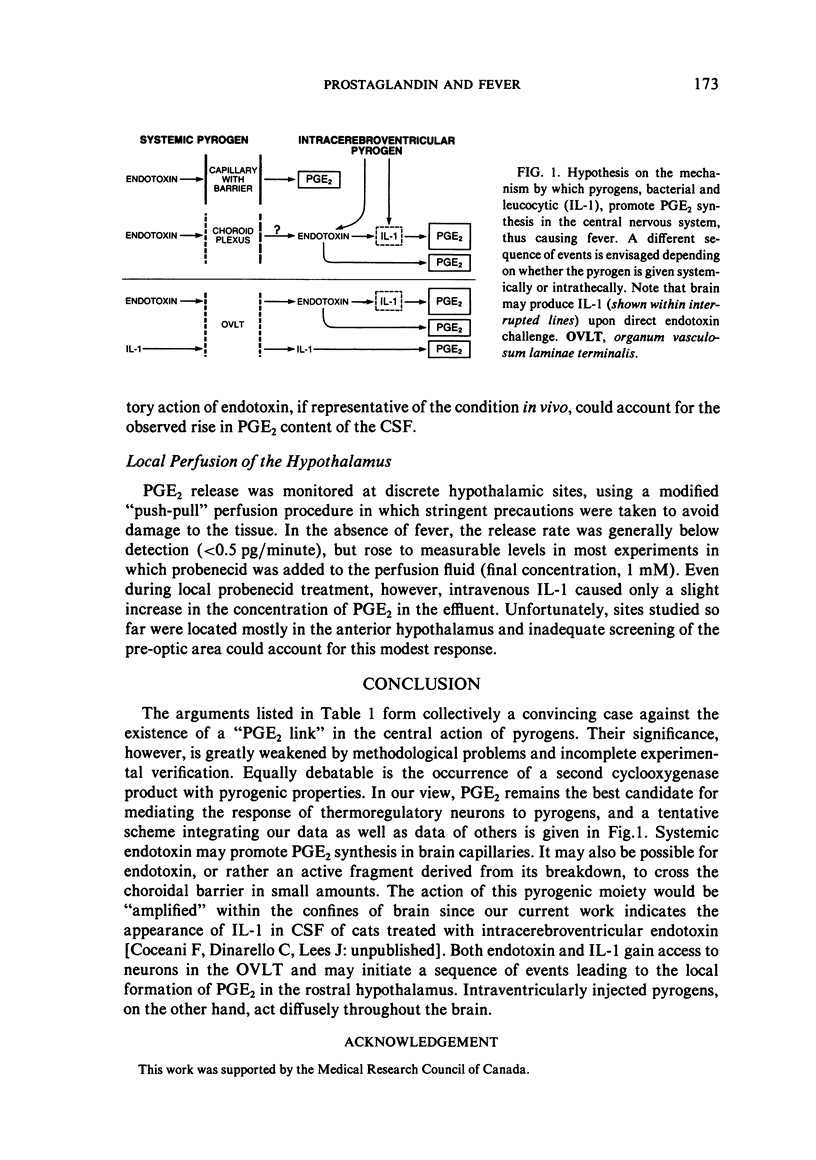
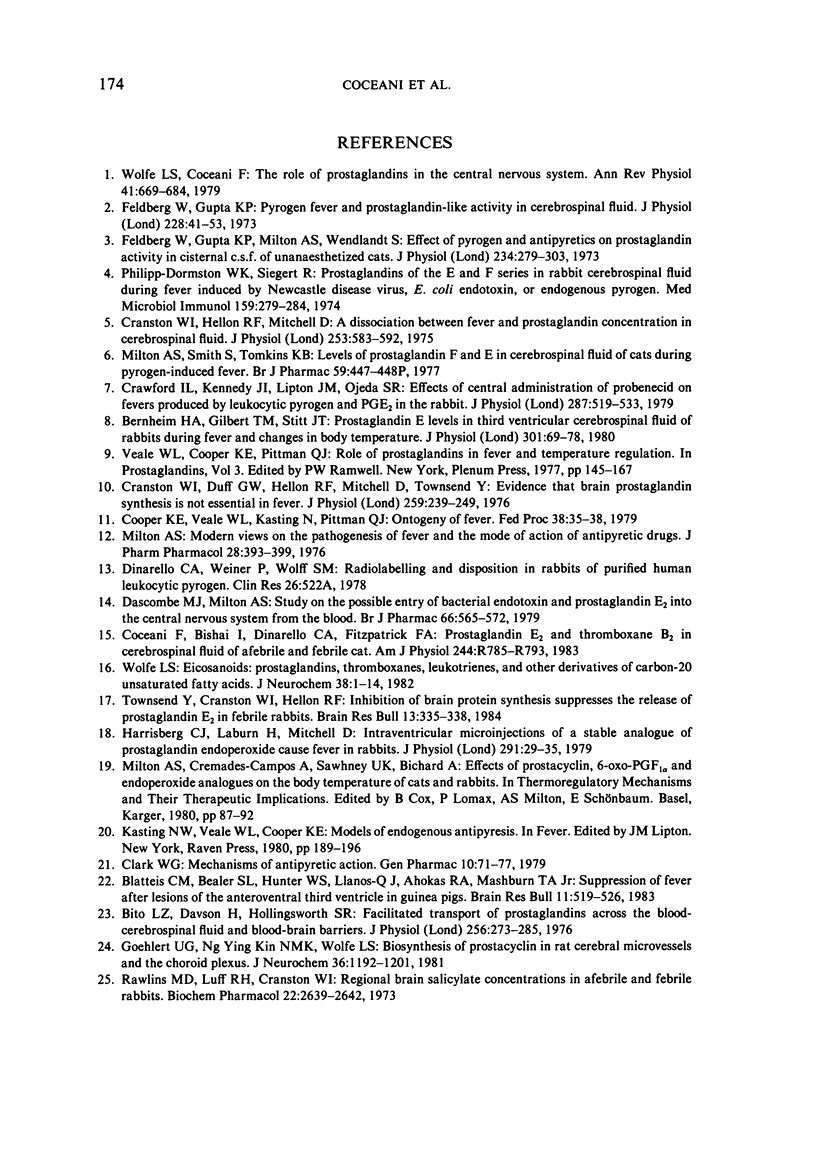
Selected References
These references are in PubMed. This may not be the complete list of references from this article.
- Bernheim H. A., Gilbert T. M., Stitt J. T. Prostaglandin E levels in third ventricular cerebrospinal fluid of rabbits during fever and changes in body temperature. J Physiol. 1980 Apr;301:69–78. doi: 10.1113/jphysiol.1980.sp013189. [DOI] [PMC free article] [PubMed] [Google Scholar]
- Bito L. Z., Davson H., Hollingsworth J. R. Facilitated transport of prostaglandins across the blood-cerebrospinal fluid and blood-brain barriers. J Physiol. 1976 Apr;256(2):273–285. doi: 10.1113/jphysiol.1976.sp011325. [DOI] [PMC free article] [PubMed] [Google Scholar]
- Blatteis C. M., Bealer S. L., Hunter W. S., Llanos-Q J., Ahokas R. A., Mashburn T. A., Jr Suppression of fever after lesions of the anteroventral third ventricle in guinea pigs. Brain Res Bull. 1983 Nov;11(5):519–526. doi: 10.1016/0361-9230(83)90124-7. [DOI] [PubMed] [Google Scholar]
- Clark W. G. Mechanisms of antipyretic action. Gen Pharmacol. 1979;10(2):71–77. doi: 10.1016/0306-3623(79)90038-7. [DOI] [PubMed] [Google Scholar]
- Coceani F., Bishai I., Dinarello C. A., Fitzpatrick F. A. Prostaglandin E2 and thromboxane B2 in cerebrospinal fluid of afebrile and febrile cat. Am J Physiol. 1983 Jun;244(6):R785–R793. doi: 10.1152/ajpregu.1983.244.6.R785. [DOI] [PubMed] [Google Scholar]
- Cooper K. E., Veale W. L., Kasting N., Pittman Q. J. Ontogeny of fever. Fed Proc. 1979 Jan;38(1):35–38. [PubMed] [Google Scholar]
- Cranston W. I., Duff G. W., Hellon R. F., Mitchell D., Townsend Y. Evidence that brain prostaglandin synthesis is not essential in fever. J Physiol. 1976 Jul;259(1):239–249. doi: 10.1113/jphysiol.1976.sp011464. [DOI] [PMC free article] [PubMed] [Google Scholar]
- Cranston W. I., Hellon R. F., Mitchell D. A dissociation between fever and prostaglandin concentration in cerebrospinal fluid. J Physiol. 1975 Dec;253(2):583–592. doi: 10.1113/jphysiol.1975.sp011208. [DOI] [PMC free article] [PubMed] [Google Scholar]
- Crawford I. L., Kennedy J. I., Lipton J. M., Ojeda S. R. Effects of central administation of probenecid on fevers produced by leukocytic pyrogen and PGE2 in the rabbit. J Physiol. 1979 Feb;287:519–533. doi: 10.1113/jphysiol.1979.sp012674. [DOI] [PMC free article] [PubMed] [Google Scholar]
- Dascombe M. J., Milton A. S. Study on the possible entry of bacterial endotoxin and prostaglandin E2 into the central nervous system from the blood. Br J Pharmacol. 1979 Aug;66(4):565–572. doi: 10.1111/j.1476-5381.1979.tb13695.x. [DOI] [PMC free article] [PubMed] [Google Scholar]
- Feldberg W., Gupta K. P., Milton A. S., Wendlandt S. Effect of pyrogen and antipyretics on prostaglandin acitvity in cisternal c.s.f. of unanaesthetized cats. J Physiol. 1973 Oct;234(2):279–303. doi: 10.1113/jphysiol.1973.sp010346. [DOI] [PMC free article] [PubMed] [Google Scholar]
- Feldberg W., Gupta K. P. Pyrogen fever and prostaglandin-like activity in cerebrospinal fluid. J Physiol. 1973 Jan;228(1):41–53. doi: 10.1113/jphysiol.1973.sp010071. [DOI] [PMC free article] [PubMed] [Google Scholar]
- Goehlert U. G., Ng Ying Kin N. M., Wolfe L. S. Biosynthesis of prostacyclin in rat cerebral microvessels and the choroid plexus. J Neurochem. 1981 Mar;36(3):1192–1201. doi: 10.1111/j.1471-4159.1981.tb01718.x. [DOI] [PubMed] [Google Scholar]
- Harrisberg C. J., Laburn H., Mitchell D. Intraventricular microinjections of a stable analogue of prostaglandin endoperoxide cause fever in rabbits. J Physiol. 1979 Jun;291:29–35. doi: 10.1113/jphysiol.1979.sp012797. [DOI] [PMC free article] [PubMed] [Google Scholar]
- Milton A. S. Modern views on the pathogenesis of fever and the mode of action of antipyretic drugs. J Pharm Pharmacol. 1976 Apr;28(4 Suppl):393–399. doi: 10.1111/j.2042-7158.1976.tb04186.x. [DOI] [PubMed] [Google Scholar]
- Milton A. S., Smith S., Tomkins K. B. Levels of prostaglandin F and E in cerebrospinal fluid of cats during pyrogen-induced fever [proceedings]. Br J Pharmacol. 1977 Mar;59(3):447P–448P. [PMC free article] [PubMed] [Google Scholar]
- Philipp-Dormston W. K., Siegert R. Prostaglandins of the E and F series in rabbit cerebrospinal fluid during fever induced by Newcastle disease virus, E. coli-endotoxin, or endogenous pyrogen. Med Microbiol Immunol. 1974 Jun 19;159(4):279–284. doi: 10.1007/BF02123737. [DOI] [PubMed] [Google Scholar]
- Townsend Y., Cranston W. I., Hellon R. F. Inhibition of brain protein synthesis suppresses the release of prostaglandin E2 in febrile rabbits. Brain Res Bull. 1984 Aug;13(2):335–338. doi: 10.1016/0361-9230(84)90135-7. [DOI] [PubMed] [Google Scholar]
- Wolfe L. S., Coceani F. The role of prostaglandins in the central nervous system. Annu Rev Physiol. 1979;41:669–684. doi: 10.1146/annurev.ph.41.030179.003321. [DOI] [PubMed] [Google Scholar]
- Wolfe L. S. Eicosanoids: prostaglandins, thromboxanes, leukotrienes, and other derivatives of carbon-20 unsaturated fatty acids. J Neurochem. 1982 Jan;38(1):1–14. doi: 10.1111/j.1471-4159.1982.tb10847.x. [DOI] [PubMed] [Google Scholar]



